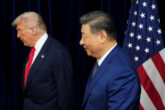September 14, 2018
What's in a name? Korean 'peace' and breaking the deadlock
Everyone wants peace on the Korean Peninsula. But what does “peace” mean and how is it achieved? This is where it gets tricky and political, dividing the hawks and the doves. It might be even more difficult for the United States and North Korea to agree on what peace means, including the meaning and implications of all of the interim steps, like a declaration ending the Korean War. The meaning of “peace” might be just as hard, if not harder, to agree on as the much-contested definition of “denuclearization.”
In stark contrast from the past, North Korea under Kim Jong Un has been adamant about securing a declaration that the Korean War is over and has insisted Washington make this declaration first before it takes any further steps toward denuclearization. Amid the push-and-pull over who should make the first move, U.S. President Donald Trump abruptly cancelled Secretary of State Mike Pompeo’s trip to Pyongyang and nuclear negotiations are currently at a standstill. The stalled talks have given a greater sense of urgency for South Korean President Moon Jae-in, who will meet Kim next Tuesday in Pyongyang for their third summit. His mission will be to further cement ways to improve inter-Korean relations as agreed upon in their April Panmunjeom Declaration, and to try to break the Washington-Pyongyang deadlock. A key objective from the April summit was to declare the Korean War over by the end of this year.
One option policymakers are considering to move negotiations forward is to trade a North Korean nuclear inventory in exchange for a declaration ending the Korean War. Such a declaration, even a purely symbolic one, would be relatively easier for the two Koreas to make, but far more complicated for the United States because it has implications for U.S. presence and interests in the region. There are clear ways to draft a symbolic declaration that does not alter the armistice regime, which has ensured co-existence between the two Koreas without armed conflict for the past 65 years. But, if mishandled, declaring the Korean War over could open the floodgates for Pyongyang and Beijing to question the validity of the armistice and demand it (along with the U.N. Command and eventually U.S. troops in the region) be removed. Such demands, in turn, could further hold up the denuclearization process.
To aid a more constructive policy debate, it is important to examine the various “peace” components, their meanings, their legal and political implications, and how they could line up with the denuclearization process. The complexities and nuances contained within could impact regional order. This understanding can also explain why many officials and experts are concerned about attaining “peace” too soon before denuclearization.
Read this article and more from War on the Rocks
More from CNAS
-
Chinese Maker of Bitcoin-Mining Machines Is a Security Threat, Says Expert
Bloomberg News reports that a Chinese manufacturer, Bitmain Technologies Ltd, that sells most of the world’s Bitcoin-mining machines — including 16,000 of them to a venture ba...
By David Feith
-
Indo-Pacific Security / Energy, Economics & Security
North Korea’s Provocations, Power Plays, and Shifting AlliancesTensions on the Korean Peninsula have reached a new and dangerous threshold. President Lee Jae Myung is warning of a real risk of accidental military clashes, as the situation...
By Dr. Go Myong-Hyun
-
Indo-Pacific Security / Energy, Economics & Security
How to Win the Economic War with ChinaTrump's approach to China has run aground, giving Beijing unprecedented advantage in the economic conflict....
By Edward Fishman & Julian Gewirtz
-
Indo-Pacific Security / Technology & National Security
Sharper: Tech + ChinaRecent talks between President Donald Trump and Chinese Communist Party General Secretary Xi Jinping placed a spotlight on emerging technologies, from high-end chips to minera...
By Charles Horn & Sevi Silvia




